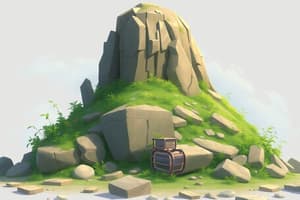Podcast
Questions and Answers
Which of the following best describes non-current liabilities?
Which of the following best describes non-current liabilities?
- Liabilities that can be converted into cash quickly.
- Liabilities that include only accounts payable and notes payable.
- Liabilities that are not expected to be settled within the next year. (correct)
- Liabilities due within one year.
How is total owners' equity calculated?
How is total owners' equity calculated?
- Capital Stock + Current Liabilities
- Retained Earnings + Total Liabilities
- Total Assets + Total Liabilities
- Total Assets - Total Liabilities (correct)
Which current asset is considered the most liquid?
Which current asset is considered the most liquid?
- Short-term Investments
- Inventory
- Accounts Receivable
- Cash (correct)
Which of the following is classified as a non-current asset?
Which of the following is classified as a non-current asset?
What component of owner's equity typically includes earnings retained in the business?
What component of owner's equity typically includes earnings retained in the business?
Which of the following is a characteristic of current assets?
Which of the following is a characteristic of current assets?
Which of the following best describes inventory on the balance sheet?
Which of the following best describes inventory on the balance sheet?
Which of the following liabilities would be classified as a current liability?
Which of the following liabilities would be classified as a current liability?
What term is used to describe the systematic process of recognizing the cost of a non-current asset as an expense over its useful life?
What term is used to describe the systematic process of recognizing the cost of a non-current asset as an expense over its useful life?
Which of the following is NOT considered a non-current asset?
Which of the following is NOT considered a non-current asset?
In calculating the annual depreciation expense, which factor is NOT required?
In calculating the annual depreciation expense, which factor is NOT required?
Which of the following costs is included in the acquisition cost of a non-current asset?
Which of the following costs is included in the acquisition cost of a non-current asset?
Which of the following statements about non-current assets is true?
Which of the following statements about non-current assets is true?
What is the exception to depreciation among non-current assets?
What is the exception to depreciation among non-current assets?
Why do pharmacies purchase non-current assets?
Why do pharmacies purchase non-current assets?
What costs are included when determining the acquisition cost of a fixed asset?
What costs are included when determining the acquisition cost of a fixed asset?
What distinguishes current liabilities from non-current liabilities?
What distinguishes current liabilities from non-current liabilities?
Which of the following is classified as a non-current asset?
Which of the following is classified as a non-current asset?
What does accumulated depreciation represent on the balance sheet?
What does accumulated depreciation represent on the balance sheet?
Which type of liability arises when goods or services are purchased on credit?
Which type of liability arises when goods or services are purchased on credit?
How is the net value of non-current assets calculated?
How is the net value of non-current assets calculated?
Which of the following best describes accounts payable?
Which of the following best describes accounts payable?
What is typically NOT included in non-current assets?
What is typically NOT included in non-current assets?
Which of the following liabilities typically arises from borrowing money?
Which of the following liabilities typically arises from borrowing money?
Flashcards are hidden until you start studying
Study Notes
Non-current Assets
- These assets, are not sold, consumed, or converted to cash within a business's normal operating cycle (usually 1 year).
- They are bought for use in the business, typically have a high cost, and are expected to last several years.
- Examples include land, buildings, fixtures, cars, and computers.
- Also referred to as fixed assets, fixtures, and equipment.
- The balance sheet shows the acquisition cost, accumulated depreciation, and net value.
Liabilities
- These are the business's debts.
- They arise from purchasing goods or services on credit, or borrowing money to finance operations.
- Classified as current or non-current.
- Current liabilities are debts due during the current operating cycle.
- Examples include accounts payable, short-term notes, accrued expenses, and the current portion of long-term debt.
Assets
- Valuable resources owned or controlled by the business, acquired at a measurable cost.
- Examples include cash, accounts receivable, delivery cars, and computers.
- Categorized as current or non-current.
- Current assets are sold, consumed, or converted to cash within the current operating cycle.
- Listed on the balance sheet in order of liquidity (ease of converting to cash).
- Common examples include cash, accounts receivable, inventories, prepaid expenses, and short-term investments.
- Cash is the most liquid asset.
Depreciation
- Non-current assets are purchased to generate revenue and are expected to last longer than 1 year.
- Also known as fixed assets, operating assets, plant and equipment, and fixtures and equipment.
- Examples include delivery cars, computers, unit dose carts, buildings, and fixtures.
- Over time, non-current assets lose value due to use and wear.
- This loss of value needs to be recognized as an expense over the asset's useful life.
- This expense is called depreciation expense.
- Depreciation systematically and rationally determines how much of a non-current asset's initial cost is recognized as an expense each year of its life.
- Land is an exception as it may generate revenue but does not lose value over time.
Calculating Depreciation Data
- Three amounts need to be known or estimated to calculate the annual depreciation expense.
- Acquisition cost: The amount the pharmacy paid for the asset, including transportation, taxes, setup costs, and any renovation or overhaul costs incurred before putting it into use.
- Useful life: The length of time the pharmacy plans to use the asset.
Studying That Suits You
Use AI to generate personalized quizzes and flashcards to suit your learning preferences.




